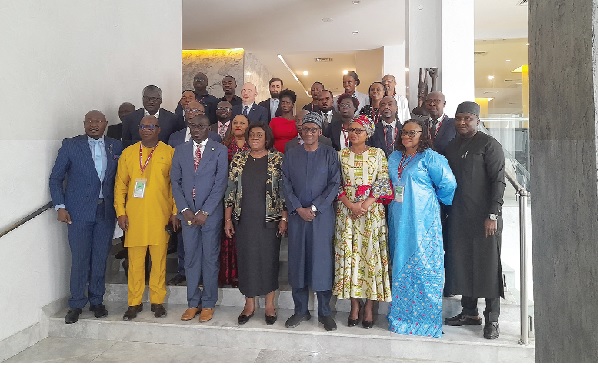The ECOWAS Resident Representative to Ghana, Mohammed Lawan Gana, has stated that illicit financial flows (IFF) continue to deprive the West African sub-region of the resources desperately needed for sustainable development, economic transformation and inclusive growth.
Quoting an April 2025 IFF report, Mr Gana said, ECOWAS states lose about $8.8 billion annually to corruption and illicit financial flows, adding that West and Central African regions were estimated to be some of the largest exporters of illicit capital on the continent.
He said that in an era of rapid globalisation and digital financial transactions, the challenges posed by money laundering and terrorist financing had become increasingly complex, highlighting that illicit activities threaten the integrity of financial systems, fund criminal enterprises, and undermine both national and international security by enabling acts of violent extremism that claim innocent lives and destabilise the region.
He therefore, urged governments in the sub-region to deliver the benefits of democracy by enhancing citizens' welfare, improving living standards and conditions, and providing basic necessities of life to reduce and eliminate the temptation for people to turn to criminality.
Seminar
Mr Gana stated this in Accra at a two-day seminar organised by the Inter-Governmental Action Group against Money Laundering in West Africa (GIABA). The seminar, attended by representatives from ECOWAS member states, focused on the role of ECOWAS resident representatives in supporting GIABA’s mandate within member states.
GIABA is a specialised institution of ECOWAS that concentrates its efforts on monitoring, assessing, and strengthening the capacities of ECOWAS member states to effectively combat money laundering and terrorism financing, alongside other initiatives supported by the Fiscal Transition Support Programme in West Africa and anti-grab agencies within member states.
Mr Gana stated that recent years had seen a deepening of terrorism and violent extremism, a resurgence of military takeovers, erosion of democratic gains, and the increasing influence of transnational organised crime.
He said that from illicit trafficking of arms and drugs to illegal mining, human trafficking, and the abuse of digital financial platforms, there was a growing convergence between insecurity and financial crime.
“Terrorist groups and organised criminal networks thrive in the shadows of weak financial oversight and porous borders, using the proceeds of crime to fund attacks, purchase influence and undermine the rule of law. These threats threaten not only our economies but peace, security and development across the region,” he lamented.
He suggested addressing the root causes of IFF, which included weak governance, endemic corruption, declining value systems, lack of transparency and the impact of unfolding geopolitical dynamics in the sub-region.
“There is a need for social re-engineering. Our value systems have collapsed due to greed for money and the get-rich-quick syndrome. The army of unemployed youth is growing daily with no end in sight. The anti-graft agencies must be transparent in their recoveries and be seen to contribute to national development to build public confidence in their activities,” he said.
Collaboration
He also emphasised the need to strengthen collaboration among domestic agencies and international partners to share intelligence and coordinate enforcement actions against safe-haven countries and islands that operated secret-coded accounts harbouring illicit funds.
The Director General of GIABA, Edwin W. Harris Junior, urged stakeholders to collaborate at all levels to combat transnational crimes by fostering an enabling environment within the governance process, aiming to contribute to a more stable, peaceful and prosperous society.
The Chief Executive Officer of Ghana’s Financial Intelligence Centre and GIABA National Correspondent, Albert Kwadwo Boafo, stated that as resident representatives, they were vital facilitators of the regional agenda for good, governance, peace and financial integrity.
The Coordinating Director for Multilateral at the Ministry of Foreign Affairs and Regional Integration, Perpetual O. Dufu, reaffirmed Ghana’s commitment to upholding the standards set by GIABA, stating that the sub-region was already grappling with economic vulnerabilities and transnational threats and could not bear the cost of inaction.
